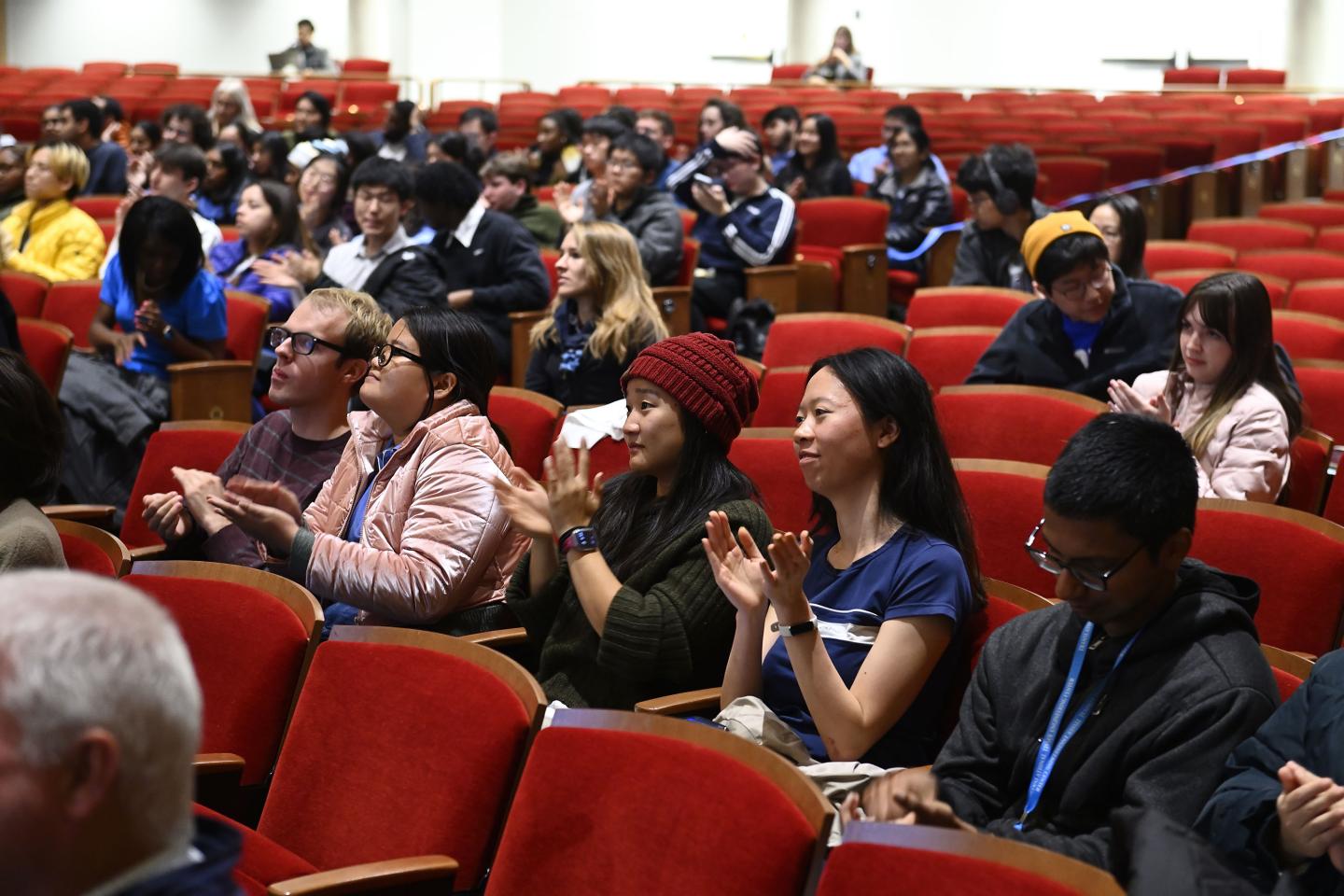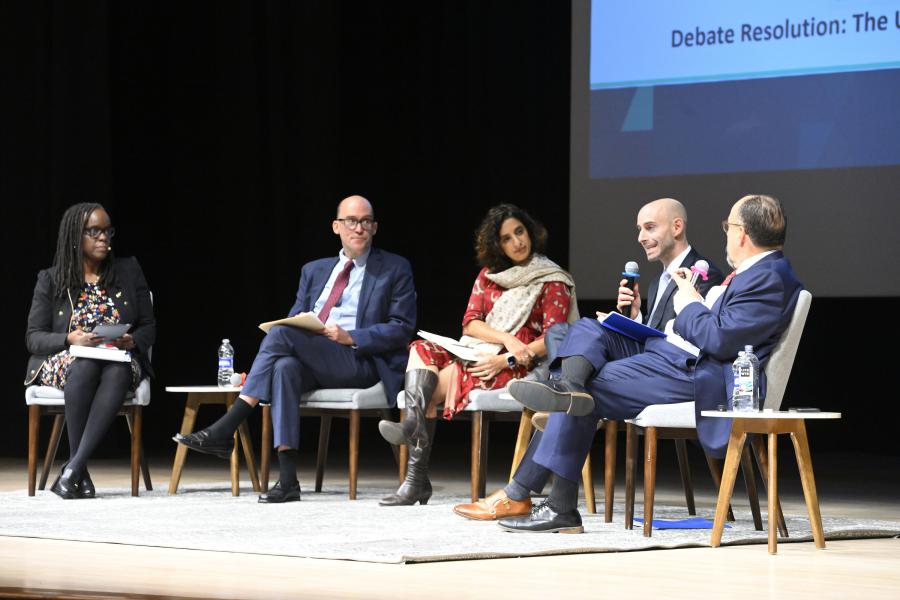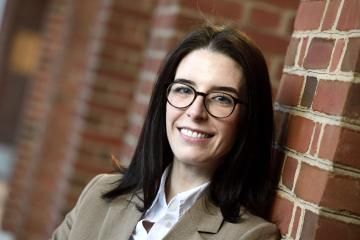Some members of Congress might resort to name-calling and near fist-fighting to resolve problems, but the Stavros Niarchos Foundation Agora Institute at Johns Hopkins University wants to model another way: dialogue and debate.
On Nov. 15, more than 170 students, faculty, and members of the public came together for a nighttime debate among experts on whether the United States still needs race-based affirmative action. The event follows the U.S. Supreme Court's landmark ruling this past summer in lawsuits against Harvard University and the University of North Carolina at Chapel Hill. In a 6-3 vote, the Supreme Court overturned four decades of precedence by declaring affirmative action policies unconstitutional—specifically, a violation of the 14th Amendment's equal protection clause barring racial discrimination. Yet the decision left colleges across the country with little guidance on how to shift practices after years of relying on affirmative action to bolster diversity on campuses.
Hosted by SNF Agora, the debate was part of the Milton S. Eisenhower Symposium, a student-run lecture series established in 1967 to bring noted speakers to Johns Hopkins to analyze important issues in fresh, incisive, and at times unsettling ways. Two students played a key role in selecting the topic and speakers—Spriha Thapa, a junior majoring in cellular and molecular biology, and Samhi Bopanna, a junior double-majoring in political science and biology.
"We started working on the event right after the Supreme Court released their ruling, and both Spriha and Samhi [knew] the topic would be top of mind for fellow students … and perfectly suited for a debate format," said Louise Flavahan, who spearheaded the event and is the director of dialogue and debate at SNF Agora.
"The question of why now and why here at Johns Hopkins feels more pressing and important than ever in the midst of global and domestic conflicts," Flavahan said. "As a university, we need to be able to speak and, perhaps more importantly, listen to one another about challenging, difficult, and sometimes seemingly intractable problems if we have any hope of solving them."
A civil discourse on a divisive topic
The debate took place in Shriver Hall, with two scholars in support of race-based affirmative action contending with two scholars who consider it unconstitutional. On the supportive side were Natasha Warikoo, a sociology professor at Tufts University and author of two recent books, Is Affirmative Action Fair? The Myth of Equity in College Admissions and Race at the Top: Asian Americans and Whites in Pursuit of the American Dream in Suburban Schools, and Jonathan Feingold, an associate professor of law at Boston University and host of the podcast #RaceClass. Arguing against the continued use of affirmative action—and in support of the Supreme Court's ruling—were Richard Kahlenberg, an economist and public policy scholar at Georgetown University, who wrote (among other books) The Remedy and Tough Liberal, and Mike Gonzalez, a senior fellow at The Heritage Foundation and author of, most recently, BLM: The Making of a New Marxist Revolution. Stephanie Shonekan, dean of the College of Arts and Humanities at the University of Maryland, moderated the debate.
"I'm deeply skeptical of debates because I think they privilege a sort of rhetorical jousting and an illusion of engagement that I think doesn't help us solve problems," Feingold said in his opening statement. He urged the debaters and audience to use the acronym LEEP as a framework for discussing race-based admissions to "avoid talking past each other," he said. In LEEP, he told the audience, the L stands for the law (Is the policy legal?), while the two Es stand for empirical and ethical (Is the policy based on empirical evidence? Is it ethical?), and the P stands for practical (Given what we know, should we implement the policy? Is it practical?).
Despite what people think, "only about 200 to 300 selective colleges, out of 4,004 colleges nationwide, used affirmative action," Warikoo said in her opening statement. Although many believe the policy "utilizes racial quotas to make the percentages of underrepresented minorities on campus mirror the broader society," that isn't the case. "Racial quotas were banned by the Supreme Court decades ago," she explained.
Another misconception: Affirmative action benefits minority students only. Not so, Warikoo argued. "Studies show that it leads to more positive racial attitudes, intellectual engagement, and civic engagement" for all students.
Gonzalez, on the dissenting side, argued that "America in the 21st century … should be embarrassed when we make decisions based on race." He went on to compare affirmative action to the historic 1896 case Plessy v. Ferguson, when the Supreme Court upheld state-mandated segregation laws. "Plessy was the low point of the court's history," Gonzalez said, adding that the court overturned Plessy with its 1954 ruling on Brown v. Board of Education of Topeka, making racial segregation illegal.
Continuing to use race as a factor in college admissions can hurt diligent and eager students, Gonzalez claimed. "There's the student who works really hard to get a good SAT and a really stellar GPA but then doesn't get into her schools of choice because of race—that is a gross harm done to her," he said. "But even worse is the student who, on the day she gets her letter of admission—supposedly the happiest day of her life—she has this suspicion she was admitted not because of her [achievements] but because of her race. She has to live with that stigma the rest of her life."
Kahlenberg, meanwhile, took issue with universities using affirmative action in ways it wasn't intended. "Rather than doing the hard work of reaching out to economically disadvantaged students of all races, [some elite schools] like Harvard … bring together fairly wealthy students of all races, which is better than all white [students] but still not true diversity," Kahlenberg said. "Harvard has a student body that is majority minority, which is something to celebrate, [but] it also has 15 times as many rich students as low-income students, which is something to be ashamed of."
Kahlenberg went on to weave in the work of Martin Luther King Jr., "who proposed a bill of rights for economically disadvantaged people of all races [and believed that] … including poor white [people] in the program was a simple matter of justice."
Reflecting on the current era
When asked what makes this moment in U.S. history the right or wrong time to end affirmative action, Feingold pointed to the changes that occurred on the Supreme Court under the Trump administration. "The reason [this happened now was] because Donald Trump had an opportunity to dramatically shift the ideological consistencies of the Court in 2016," Feingold said, referring to the three justices Trump appointed—Neil Gorsuch, Brett Kavanaugh, and Amy Coney Barrett—who voted to abolish affirmative action once and for all.
Warikoo, during her allotted time, said the moment to end affirmative action has not arrived yet because race and class still influence how people live in the U.S. "When you compare a poor or working-class Black family with a poor or working-class white family, [data shows that] they often live in different kinds of neighborhoods," she said. "The white family is more likely to live in a more mixed-income neighborhood and go to schools with higher levels of academic achievement than poor Black kids," she said.
Similarly, Warikoo maintained, Black families have had fewer years to save money and accumulate wealth than white families. This, in turn, contributes to a median household wealth among Black families that is 15% that of white families, which "makes a big difference in putting a down payment on a house," she said. That's why "we need both race and class consideration [in college admissions]."
Finding common ground
Mala Malhotra-Ortiz, an attorney and adjunct law professor at the University of Maryland, served as the evening's dispute resolution expert, charged with advancing the conversation and finding shared goals and opinions among debaters. "There's a common belief among all of you that race does matter and that you want to celebrate minorities, Malhotra-Ortiz said. "[Yet] there's an assumption here that going to Harvard or North Carolina or [some other] university might somehow give you more power. Maybe that's true—that is the assumption—[but remember that some] people who dropped out became famous, wealthy, and powerful."
"Some of you talked a bit about authentic equity, [as opposed to] this check-the-box exercise of a quota or counting marbles and so on," she continued. "Using affirmative action as a way to actually gauge where we are versus guide us on where to be—that's a difference and a nuance that I think you are all coming to or that you might agree to use as a gauge for [the question]: Are we being fair?"
In her closing statement, Warikoo picked up and elaborated on Malhotra-Ortiz's comment about the status and power associated with certain schools. "Part of this debate about college admissions is because we are so focused on a very small number of elite colleges, and these colleges have not expanded [to make room for] … the many amazing young people in our country," she said.
"There are going to be winners and losers, and it's tragic that [these universities] are admitting such a small percentage of students who apply," Warikoo said. She urged the U.S. to move on from debating who deserves a spot in a selective university and who doesn't, and from saying one person is better simply because a high-ranking institution admitted them—this is a fruitless and problematic conversation, leading to [behaviors like] "parents putting stickers on their cars and saying, 'My child is so amazing.'" Instead, she contended, we need to recognize that our society, as it exists now, is full of inequities, and that everyone who wants and seeks a world-class education deserves a shot.

Image credit: Will Kirk / Johns Hopkins University
Posted in Voices+Opinion, Politics+Society
Tagged mse symposium, snf agora institute









